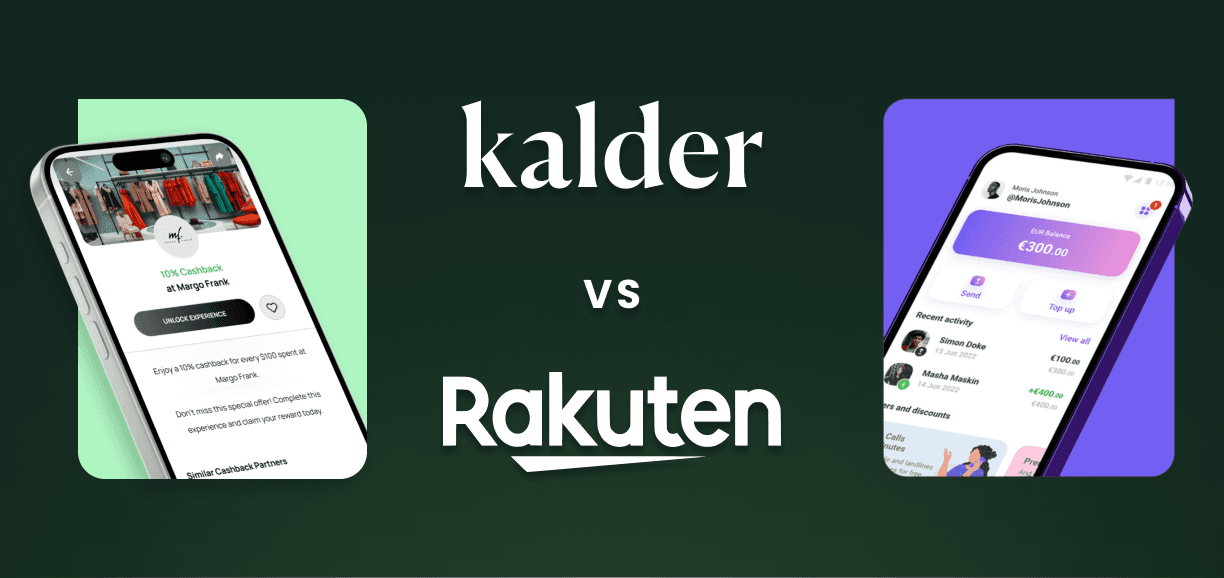Why Choose Kalder Over Rakuten?
Kalder and Rakuten operate in the rewards space, but Kalder offers a more tailored, data-driven, and seamless approach that caters specifically to businesses seeking deeper customer engagement and actionable insights. Here’s a breakdown of key differentiators:
1. Whitelabel Solution vs. Third-Party Brand
Kalder:
Offers a whitelabel platform that integrates directly into your existing app or website, maintaining your brand identity and customer experience.
Customers interact with your brand, not a third-party platform, keeping loyalty focused on your ecosystem.
Rakuten:
Operates as a consumer-facing cashback portal, meaning customers interact primarily with Rakuten's brand, not yours.
Loyalty may shift to Rakuten rather than staying with your brand.
2. Real-Time Transaction Data and Insights
Kalder:
Provides real-time transaction tracking from linked credit and debit cards, allowing you to monitor customer spending patterns and optimize rewards programs dynamically.
Enables actionable insights into customer behavior to refine engagement strategies and maximize ROI.
Rakuten:
Tracks transactions primarily through affiliate links or third-party systems, with limited visibility into real-time spending behavior.
Insights are not tailored for businesses seeking granular, transaction-level data.
3. Seamless Card-Linked Offers vs. Affiliate Links
Kalder:
Uses card-linking technology to enable seamless rewards—customers earn automatically when they use their linked card at participating merchants.
No need for customers to click affiliate links or manually track offers, reducing friction and increasing redemption rates.
Rakuten:
Relies on affiliate links or portals, requiring customers to initiate purchases through Rakuten’s platform, which adds friction to the experience.
4. Customization and Flexibility
Kalder:
Fully customizable rewards programs tailored to your brand’s specific goals, customer segments, and industry needs.
Supports cashback, loyalty points, or other unique incentives, allowing for flexibility in program design.
Rakuten:
Offers limited customization since it operates as a general cashback platform catering to multiple brands.
5. Direct Relationships with Customers
Kalder:
Allows you to maintain a direct relationship with your customers, enabling better engagement and retention strategies.
Keeps customer data within your ecosystem, enhancing long-term loyalty.
Rakuten:
Owns the customer relationship and data, which may limit your ability to directly engage with your audience or create long-term loyalty strategies.
6. Cost Efficiency
Kalder:
Uses a transparent pricing model, often based on connected card fees or revenue-sharing structures, making it cost-effective for brands seeking tailored solutions.
Avoids the higher fees often associated with affiliate networks.
Rakuten:
Charges brands on CPA basis, which can become expensive, especially if customers don’t provide long-term value after initial acquisitions.
7. Enhanced Customer Experience
Kalder:
Simplifies the customer experience by automatically linking rewards to purchases made with their card—no extra steps or portals required.
Builds loyalty directly to your brand through seamless integrations.
Rakuten:
Requires customers to actively engage with Rakuten’s platform to earn rewards, potentially creating friction and deterring repeat use.
8. Tailored for Businesses vs. Broad Consumer Platform
Kalder:
Focuses on providing solutions for brands seeking to launch tailored rewards programs that align with specific business objectives.
Offers advanced tools for data-driven engagement and retention strategies.
Rakuten:
Functions primarily as a broad, consumer-facing cashback platform, catering to a general audience and prioritizing Rakuten’s ecosystem.
Ideal Use Cases
Kalder:
Best for businesses that want a branded, customizable rewards program to increase customer loyalty, retention, and engagement while gaining actionable insights into spending behavior.
Rakuten:
Suitable for businesses looking to drive one-time acquisitions through a third-party platform with minimal control over customer relationships.
Conclusion
Kalder offers a more personalized, brand-centric solution that aligns with your long-term goals of loyalty and customer engagement. By providing seamless card-linked rewards, real-time insights, and a white-labeled platform, Kalder ensures that your customers remain loyal to your brand—not a third-party intermediary.


